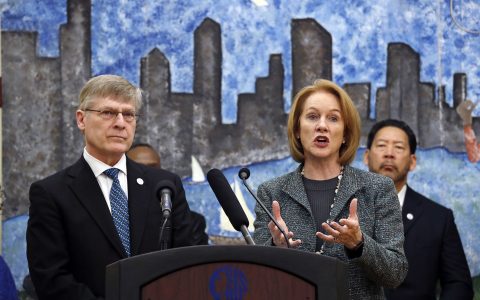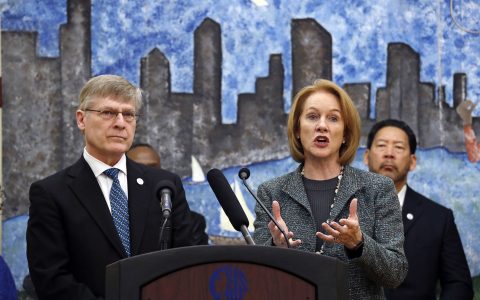Seven years after Washington legalized the adult use of cannabis, Gov. Jay Inslee says he plans to pardon thousands of convictions for misdemeanor possession.
Gov. Jay Inslee
“We shouldn’t be punishing people for something that is no longer illegal behavior in the state of Washington,” Inslee said, while announcing his Marijuana Justice Initiative.
The Democrat, who is mulling a 2020 presidential run, made the announcement Friday morning at the Washington State Cannabis Summit. Inslee said he was creating an expedited process that would allow about 3,500 people to apply for and receive a pardon without having to hire a lawyer or go to court.
Inslee’s initiative does not require approval by the state legislature. He’s enacting it under his state constitutional clemency authority.
Several states allow for expunging or sealing marijuana convictions, and several cities have taken steps to clear marijuana possession convictions en masse. One new law in California automatically erases or reduces marijuana-related convictions.
Inslee called it an injustice that small-time convictions have hampered people’s ability to buy a house, get a job or chaperone field trips.
Following Seattle’s Lead
Inslee’s move came nearly a year after Seattle City Attorney Pete Holmes, working with Mayor Jenny Durkan, enacted a plan to clear more than 500 past cannabis convictions within the city’s municipal court system.
Holmes’s plan took months to work its way through the city’s judicial system. In September, Seattle Municipal Court judges approved the plan, which would wipe away the cannabis convictions of up to 542 people who were sentenced for offenses between 1996 and 2010. (Seattle stopped prosecuting low-level cannabis offenses after 2010.)
In a previous article, Leafly’s Ben Adlin explained that the Seattle plan wiped out those convictions automatically, whether the past offender applied for expungement or not:
Under the court’s Sept. 11 order, the city attorney’s office will provide the court with the last known address of each affected defendant. The court will then mail a notice to the defendants, giving each the opportunity to object to their conviction being vacated or ask for their case to be considered individually. If individuals don’t respond within 33 days of the notice being sent, their convictions will be vacated automatically.
Under Gov. Inslee’s statewide plan, a pardon would not be automatic. Individuals have to apply for a pardon, but shouldn’t have to hire an attorney or go to court. (See link to application process below.) The plan will cover people with a single marijuana conviction prosecuted in Washington State between Jan. 1, 1998, and Dec. 5, 2012, when Initiative 502 officially legalized cannabis possession for adults.
Good First Step
Drug reform advocates hailed Inslee’s move as a strong step toward righting the wrongs of the past.
“This is a necessary first step for repairing the racially disparate harms of marijuana prohibition,” said Jolene Forman, senior staff attorney for the Drug Policy Alliance. “This will give thousands of people a fresh start to pursue education and employment without the stain of a criminal conviction.”
“Black and brown people are much more likely to be arrested for marijuana offenses than white people, despite similar rates of use across races,” Forman added. “We encourage Governor Inslee to clear all prior marijuana convictions, in order to repair the historical inequities in marijuana enforcement. People convicted of marijuana offenses before legalization should be treated like they would be today.”
How to Apply
The governor’s office already has a web site devoted to the Marijuana Justice Initiative.
To be eligible for clemency through the Initiative, a past conviction must meet the following parameters:
- It must be an adult conviction for misdemeanor marijuana possession
- Prosecuted under Washington state law (RCW), not a local ordinance
- The conviction must have occurred between January 1, 1998 and December 5, 2012
- It must be the only conviction on your criminal record
If you do not meet these parameters, you are not eligible for relief through the Marijuana Justice Initiative. You can, however, still pursue clemency for other state law convictions by filing a petition with Washington State’s Clemency and Pardons Board.
















